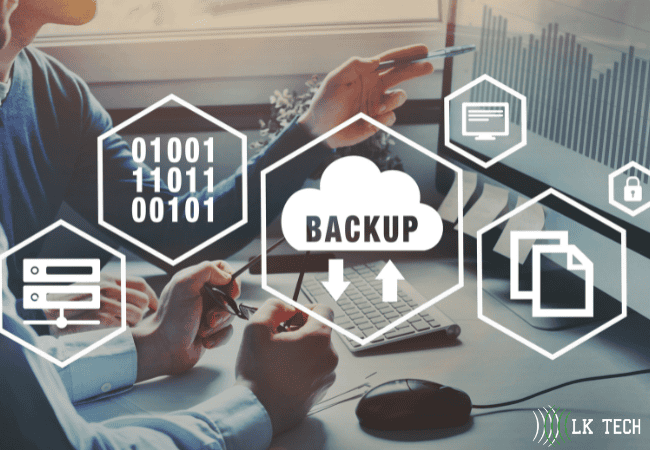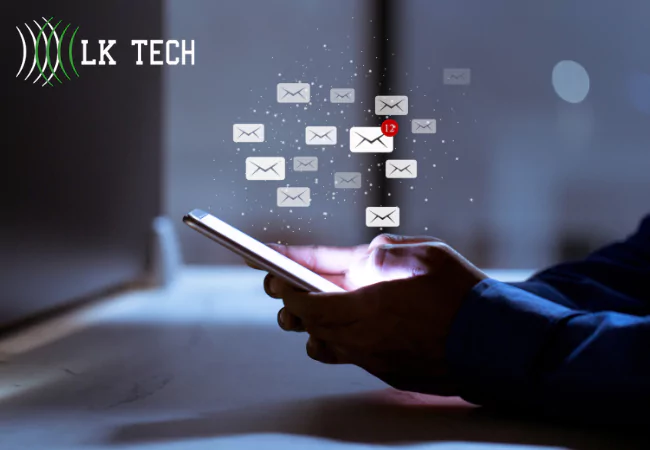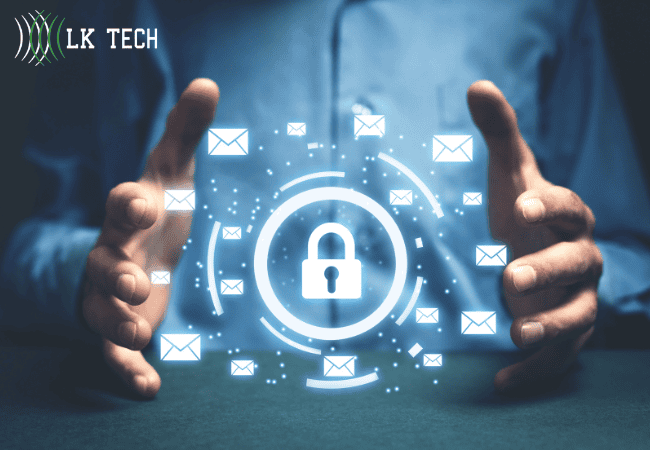In today's digital age, keeping your emails secure isn't just about protecting data—it's about safeguarding your business's reputation and ensuring trust with your clients. Let's dive into some essential email security practices that can keep your communications safe and your business running smoothly.

Importance of Email Security for Small Businesses
Small businesses often handle sensitive information, including customer data, financial records, and proprietary information. Email is a common target for cybercriminals seeking to exploit vulnerabilities and gain unauthorized access to such valuable data. Implementing email security measures helps protect against various threats, including unauthorized access, data breaches, and phishing attempts.
By prioritizing email security, small businesses can:
- Safeguard sensitive information: Email encryption and secure communication protocols ensure that sensitive data is protected during transmission, reducing the risk of interception or unauthorized access.
- Maintain customer trust: A data breach or email security incident can damage a small business's reputation and erode customer trust. By implementing robust email security measures, businesses demonstrate their commitment to protecting customer information and maintaining confidentiality.
- Comply with regulations: Small businesses often handle data subject to industry-specific regulations, such as the General Data Protection Regulation (GDPR) or the Health Insurance Portability and Accountability Act (HIPAA). Adhering to email security best practices helps meet regulatory requirements and avoid potential penalties.
Consequences of Poor Email Security Practices
Failure to prioritize email security can have severe consequences for small businesses. Some of the potential risks and consequences include:
- Data breaches: A data breach resulting from poor email security practices can lead to the exposure of sensitive customer data, financial loss, and legal liabilities. Recovering from a data breach can be costly and time-consuming.
- Loss of business opportunities: If a small business falls victim to phishing attacks, it may unknowingly disclose sensitive information or compromise its clients' data. This loss of trust can result in the loss of potential business opportunities and damage the business's reputation.
- Regulatory penalties: Non-compliance with industry-specific regulations can lead to significant financial penalties and legal ramifications. Small businesses must adhere to email security best practices to avoid such penalties.
- Disruption of operations: Email security incidents, such as malware infections or ransomware attacks, can disrupt business operations, leading to downtime, loss of productivity, and potential financial losses.
Email security is essential for small businesses, ensuring the protection of sensitive data, maintaining customer trust, complying with regulations, and mitigating associated risks. Implementing best practices is crucial to achieving these goals.
Implementing Email Security Best Practices
To ensure the security of your organization's email communications, implementing best practices that protect against potential threats and vulnerabilities is crucial. Following these recommendations significantly reduces the risk of email-related security incidents. Two critical areas to focus on include employee training and awareness, alongside the use of strong passwords and multi-factor authentication.
Employee Training and Awareness
One of the most critical aspects of email security is educating employees about potential risks and best practices. Conduct regular training sessions to raise awareness about email security threats, such as phishing attacks, malware, and social engineering. Provide practical examples and real-life scenarios to help employees recognize and respond appropriately to suspicious emails.
Training should cover topics such as:
- Identifying phishing attempts: Teach employees to be cautious of emails requesting sensitive information, urging urgent action, or containing suspicious links or attachments. Encourage them to verify the authenticity of emails before clicking on any links or providing personal information.
- Handling suspicious emails: Instruct employees on how to report suspicious emails or potential security incidents to the appropriate IT personnel. Establish clear procedures for reporting and responding to such incidents to ensure a swift and effective response.
- Social engineering awareness: Educate employees about the tactics used in social engineering attacks, which involve manipulating individuals into divulging sensitive information or performing actions that compromise security. By increasing awareness, employees can be more vigilant against these types of attacks.
Fostering a culture of security awareness empowers employees to be the first line of defense against email security threats. Regular refresher training sessions and ongoing communication about emerging threats are essential to keep employees updated with the latest email security practices.
Use of Strong Passwords and Multi-Factor Authentication
Passwords play a crucial role in email security. Encourage employees to create strong, unique passwords that are difficult for others to guess. Strong passwords should consist of a combination of upper and lowercase letters, numbers, and special characters. Avoid using common phrases or personal information that could be easily guessed.
Additionally, implementing multi-factor authentication (MFA) adds an extra layer of security to email accounts. MFA requires users to provide multiple forms of verification, such as a password and a unique code sent to their mobile device, before accessing their email. This significantly reduces the risk of unauthorized access, even if a password is compromised.
Consider using a password management tool to securely store and generate complex passwords for employees. This helps ensure that passwords are not easily forgotten or reused across multiple accounts.
Some of the best password creation practices include:
- Use a combination of uppercase and lowercase letters, numbers, and special characters.
- Avoid using common phrases or personal information.
- Create unique passwords for each account.
- Regularly update passwords and avoid reusing them.
Implementing strong password policies and encouraging the use of multi-factor authentication enhances the security of your organization's email communications. Email security is an ongoing process that requires continuous monitoring and adaptation to emerging threats. Prioritizing employee training and awareness, along with enforcing strong password practices, significantly strengthens your organization's email security defenses.
Secure Email Communication
By adopting best practices for secure email communication, you not only protect against data breaches and unauthorized access but also ensure the integrity of your business interactions. Remember, encrypting sensitive data and being vigilant against phishing attempts and suspicious emails are essential steps in maintaining robust email security.
Encryption of Sensitive Data
Encrypting sensitive data is a crucial step in ensuring the confidentiality of email communications. Encryption converts the content of an email into an unreadable format, making it inaccessible to unauthorized individuals. By encrypting sensitive data, businesses can mitigate the risk of data breaches and unauthorized access to confidential information.
There are different methods of email encryption, such as end-to-end encryption and transport layer security (TLS). End-to-end encryption ensures that only the intended recipient can decrypt and read the email, while TLS encryption secures the transmission of emails between servers. It's important to use encryption techniques that align with industry standards and comply with relevant regulations.
To further enhance email security, businesses can implement digital signatures. Digital signatures provide authentication and ensure the integrity of the email content by verifying the sender's identity and detecting any tampering with the email during transmission.
Avoiding Phishing Attempts and Suspicious Emails
Phishing attempts and suspicious emails pose significant threats to email security. Phishing is a technique used by cybercriminals to deceive individuals into providing sensitive information or downloading malicious content. It's crucial for businesses and individuals to be vigilant and employ strategies to avoid falling victim to phishing attacks.
To protect against phishing attempts and suspicious emails, it's important to educate employees on the common signs of phishing and how to identify fraudulent emails. Some key indicators of phishing emails include unfamiliar senders, misspelled or suspicious email addresses, requests for personal information, urgent or threatening language, and poorly written content.
To mitigate the risk of phishing attacks, businesses should implement email filtering systems that can detect and block suspicious emails. These systems can analyze the content, attachments, and sender information to identify potential phishing attempts and prevent them from reaching employees' inboxes.
Additionally, it's crucial to emphasize the importance of not clicking on suspicious links or downloading attachments from unknown sources. Encouraging employees to report any suspicious emails to the IT department or security team is essential for proactive threat detection and response.
Prioritizing secure email communication through encryption and vigilant practices to avoid phishing attempts helps businesses protect their sensitive information and maintain the confidentiality of their email communications. Regularly reviewing and updating email security practices is crucial to staying ahead of evolving cybersecurity threats.

Protecting Against Malware and Ransomware
Malware and ransomware attacks can compromise sensitive data, disrupt business operations, and lead to financial losses. Implementing effective measures to safeguard against these threats is essential for small businesses. Two key practices to consider are email filtering and anti-malware software, as well as regular software updates and patch management.
Email Filtering and Anti-Malware Software
Email filtering plays a vital role in preventing malicious content from reaching your inbox. It acts as a barrier, scanning incoming emails for potential threats and filtering out suspicious or harmful messages. By implementing advanced email filtering solutions, businesses can significantly reduce the risk of malware and ransomware infiltrating their systems.
Anti-malware software is another crucial component of email security. It detects and eliminates malware, including viruses, worms, and Trojans, that may be embedded within email attachments or links. Regularly updating and maintaining anti-malware software ensures that your business is protected against emerging threats and vulnerabilities.
Regular Software Updates and Patch Management
Keeping software up to date is imperative for maintaining a secure email environment. Software developers regularly release updates and patches to address vulnerabilities and improve security. Failing to install these updates promptly can leave your systems exposed to potential attacks.
Implementing a robust patch management process is essential. This involves regularly assessing and applying software updates across all devices and applications used within your organization. By promptly addressing security patches and software updates, you reduce the risk of exploitation by malware and ransomware.
To ensure the effectiveness of your patch management process, consider using automated tools that can streamline the update process and provide centralized control. These tools can help you keep track of software versions, schedule updates, and ensure that critical security patches are implemented in a timely manner.
Prioritizing email filtering, anti-malware software, and regular software updates significantly enhances small businesses' defenses against malware and ransomware attacks. These practices are essential components of a comprehensive email security strategy, crucial for protecting sensitive data, maintaining operational continuity, and safeguarding your business's reputation.

Email Storage and Backup
Ensuring the security and integrity of your email communications goes beyond protecting against external threats. It's equally important to have proper email storage and backup measures in place. In this section, we will explore two essential components of email security: secure email archiving and regular backups with disaster recovery plans.
Secure Email Archiving
Secure email archiving involves the systematic storage and preservation of emails for future reference, compliance, and legal purposes. It ensures that important email communications are securely stored and readily accessible when needed.
One of the primary benefits of email archiving is the ability to maintain a tamper-proof record of all incoming and outgoing emails. Archiving solutions often include features like encryption, access controls, and audit trails to ensure the integrity and confidentiality of archived emails. Additionally, archiving helps to free up storage space within email servers, improving overall performance and efficiency.
When selecting an email archiving solution, consider its compatibility with your existing email infrastructure and compliance requirements. It's crucial to choose a solution that can seamlessly integrate with your email system and provides robust search capabilities for efficient retrieval of archived emails.
Regular Backups and Disaster Recovery Plans
In addition to email archiving, regular backups and disaster recovery plans are vital to protect against data loss and ensure business continuity. By regularly backing up your email data, you can restore it in the event of accidental deletion, hardware failure, or other unforeseen circumstances.
A comprehensive backup strategy should include regular backups of your email server data, configuration settings, and user accounts. These backups should be stored securely in offsite locations or in the cloud to protect against physical damage or loss. Cloud-based backup solutions offer the added advantage of automated backups, reducing the risk of human error.
In conjunction with backups, having a well-defined disaster recovery plan is crucial. This plan outlines the steps to be taken in the event of a data loss or system failure, ensuring a swift and effective recovery process. It should include procedures for restoring email data from backups, notifying users, and testing the recovery process regularly to ensure its effectiveness.

Monitoring and Incident Response
To ensure robust email security, it's essential for businesses to implement proactive monitoring of email systems and have incident response plans in place to address security breaches promptly.
Proactive Monitoring of Email Systems
Proactively monitoring email systems is a critical component of effective email security. By monitoring email activities, businesses can detect and respond to potential threats in a timely manner. Here are some best practices for proactive monitoring:
- Email Security Auditing: Regularly audit email security configurations, access controls, and user permissions to identify vulnerabilities and ensure compliance with security policies. This helps in identifying any misconfigurations or unauthorized access attempts.
- Email Traffic Monitoring: Monitor email traffic patterns and analyze email logs for any suspicious activity, such as multiple failed login attempts or unusual email attachment sizes. Implementing email traffic monitoring tools can help identify potential threats and prevent them from escalating.
- User Behavior Analytics: Utilize user behavior analytics tools to establish a baseline for normal email usage patterns. This enables businesses to identify any deviations from the norm, such as a sudden increase in email volume or unusual attachment downloads, which could indicate a potential security breach.
- Real-time Alerts: Set up real-time alerts for specific email security events, such as failed login attempts or the presence of malicious attachments. These alerts can prompt immediate action and help mitigate potential risks.
Proactively monitoring email systems allows businesses to detect and respond to security threats promptly, minimizing the impact of potential breaches.
Incident Response Plans for Security Breaches
No matter how robust your email security measures are, there is always a possibility of a security breach. Having a well-defined incident response plan is crucial to handling such situations effectively. Here are some key considerations for incident response plans:
- Designated Incident Response Team: Establish a team responsible for handling email security incidents. This team should include representatives from IT, security, legal, and management departments to ensure a swift and coordinated response.
- Clear Communication Channels: Define clear communication channels and escalation procedures to ensure that all relevant stakeholders are informed promptly. This includes internal teams, external partners, and customers who may be affected by the incident.
- Containment and Investigation: Once a security breach is identified, the incident response team should focus on containing the breach and conducting a thorough investigation to determine the extent of the damage. This may involve isolating affected systems, preserving evidence, and analyzing logs.
- Notification and Reporting: Depending on the nature of the breach and applicable regulations, businesses may be required to notify affected individuals, regulatory authorities, or law enforcement agencies. It's important to have a process in place for timely and accurate reporting to the appropriate entities.
- Remediation and Recovery: After containing the breach, businesses should take steps to remediate the vulnerabilities that led to the incident. This may involve patching software vulnerabilities, strengthening access controls, or revising security policies.
Implementing proactive monitoring of email systems and having incident response plans in place are crucial steps in maintaining strong email security practices. These measures help businesses stay one step ahead of potential threats and protect sensitive data from unauthorized access or misuse.

Rely on LK Tech's Email Security Services in Cincinnati
Protect your business's sensitive communications with LK Tech's specialized Email Security Services in Cincinnati. We offer comprehensive solutions including advanced threat detection, secure email encryption, and robust anti-phishing measures. Our tailored approach ensures your emails are safeguarded against cyber threats, maintaining the confidentiality and integrity of your communications.
Partner with LK Tech to enhance your email security and fortify your business against potential risks. Contact us today to learn more about how our expert IT solutions can benefit your organization.


